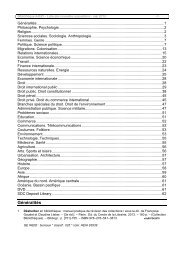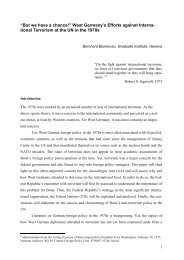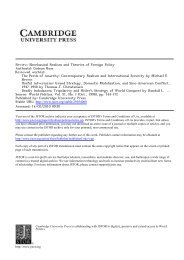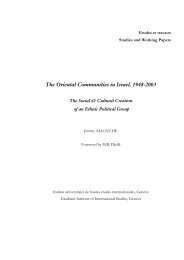Extending International Criminal Law beyond the Individual to ...
Extending International Criminal Law beyond the Individual to ...
Extending International Criminal Law beyond the Individual to ...
Create successful ePaper yourself
Turn your PDF publications into a flip-book with our unique Google optimized e-Paper software.
<strong>Extending</strong> <strong>International</strong> <strong>Criminal</strong> <strong>Law</strong> 909<br />
<strong>the</strong> ICTY. It has been suggested that this indirect form of participation ‘may<br />
cover acts that in <strong>the</strong> Yugoslavia Tribunal’s case law warranted liability for<br />
participation in a joint criminal enterprise’. 33 The ICTY has explained its<br />
approach in a number of cases with <strong>the</strong> general argument first being articulated<br />
in <strong>the</strong> Tadic¤ case, where <strong>the</strong> Tribunal explained that criminal liability<br />
extends in this way <strong>beyond</strong> those who physically commit <strong>the</strong> abuses:<br />
‘Although only some members of <strong>the</strong> group may physically perpetrate <strong>the</strong><br />
criminal act (murder, extermination, wan<strong>to</strong>n destruction of cities, <strong>to</strong>wns or<br />
villages, etc.), <strong>the</strong> participation and contribution of <strong>the</strong> o<strong>the</strong>r members of <strong>the</strong><br />
group is often vital in facilitating <strong>the</strong> commission of <strong>the</strong> offence in question. It<br />
follows that <strong>the</strong> moral gravity of such participation is often no less ç or indeed<br />
no different ç from that of those actually carrying out <strong>the</strong> acts in question.’ 34<br />
The Appeals Chamber has more recently summarized <strong>the</strong> types of joint criminal<br />
enterprise under three headings: all of <strong>the</strong> co-perpetra<strong>to</strong>rs possess <strong>the</strong><br />
same intent <strong>to</strong> effect <strong>the</strong> common purpose; a ‘systemic’ form where <strong>the</strong> perpetra<strong>to</strong>rs<br />
have personal knowledge of <strong>the</strong> organized criminal system; and a third<br />
‘extended’ form where crimes are committed <strong>beyond</strong> <strong>the</strong> common purpose, but<br />
which are a natural and foreseeable consequence of this common purpose. 35<br />
This type of participation in <strong>the</strong> crime requires one <strong>to</strong> identify two different<br />
intentions. According <strong>to</strong> <strong>the</strong> ICC Statute we need: first an intentional contribution,<br />
and second, knowledge of <strong>the</strong> intention of <strong>the</strong> group. The secondary<br />
participant, or in our case, <strong>the</strong> complicit corporation, can ei<strong>the</strong>r intend <strong>to</strong><br />
fur<strong>the</strong>r <strong>the</strong> crime, or simply intentionally contribute with knowledge of <strong>the</strong><br />
o<strong>the</strong>rs’ intention <strong>to</strong> commit <strong>the</strong> crime. The Statute is complex in this regard but<br />
it does admit that one can be criminally liable even where one only has knowledge<br />
of <strong>the</strong> crime ra<strong>the</strong>r than a shared purpose <strong>to</strong> commit that crime. The Pre-<br />
Trial Chamber of <strong>the</strong> ICC has explained that this residual form of liability<br />
presents a threshold for a different, seemingly less engaged state of mind, and<br />
can be likened <strong>to</strong> joint criminal enterprise:<br />
In this regard, <strong>the</strong> Chamber notes that, by moving away from <strong>the</strong> concept of co-perpetration<br />
embodied in article 25(3)(a), article 25(3)(d) defines <strong>the</strong> concept of (i) contribution <strong>to</strong> <strong>the</strong><br />
commission or attempted commission of a crime by a group of persons acting with a<br />
common purpose, (ii) with <strong>the</strong> aim of fur<strong>the</strong>ring <strong>the</strong> criminal activity of <strong>the</strong> group or in<br />
<strong>the</strong> knowledge of <strong>the</strong> criminal activity of <strong>the</strong> group or in <strong>the</strong> knowledge of <strong>the</strong> criminal<br />
purpose.<br />
33 G. Werle,‘<strong>Individual</strong> <strong>Criminal</strong> Responsibility in Article 25 ICC Statute’, 5 Journal of <strong>International</strong><br />
<strong>Criminal</strong> Justice (2007) 953^975, at 974^975. See also E. van Sliedregt, The <strong>Criminal</strong><br />
Responsibility of <strong>Individual</strong>s for Violations of <strong>International</strong> Humanitarian <strong>Law</strong> (The Hague: T.M.C.<br />
Asser Press, 2003), at 41^115; A. Eser, ‘<strong>Individual</strong> <strong>Criminal</strong> Responsibility’, in A. Cassese,<br />
P. Gaeta and J.R.W.D. Jones (eds), The Rome Statute of <strong>the</strong> <strong>International</strong> <strong>Criminal</strong> Court: A<br />
Commentary (Oxford: Oxford University Press, 2002), 767^822; W.A. Schabas, ‘Enforcing<br />
<strong>International</strong> Humanitarian <strong>Law</strong>: Catching <strong>the</strong> Accomplices’, 83 <strong>International</strong> Review of <strong>the</strong> Red<br />
Cross (2001) 439^459; K. Ambos, ‘Article 25’, in O. Triffterer (ed.), Commentary on <strong>the</strong> Rome<br />
Statute of <strong>the</strong> <strong>International</strong> <strong>Criminal</strong> Court (Baden-Baden: Nomos, 1999), 475^493.<br />
34 Judgment, Tadic¤ (IT-94-1-A), Appeals Chamber, 15 July 1999, x 191.<br />
35 Judgment, Kvoc› ka (IT-98-30/1-A), Appeals Chamber, 28 February 2005, xx 81^83.



![Download [pdf] - The Graduate Institute, Geneva](https://img.yumpu.com/23370020/1/190x248/download-pdf-the-graduate-institute-geneva.jpg?quality=85)












